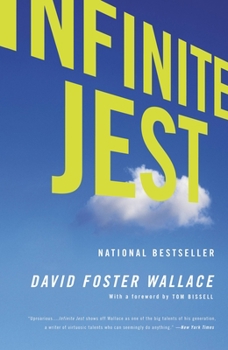Infinite Jest
Select Format
Select Condition 
Book Overview
A gargantuan, mind-altering comedy about the Pursuit of Happiness in America Set in an addicts' halfway house and a tennis academy, and featuring the most endearingly screwed-up family to come along in recent fiction, Infinite Jest explores essential questions about what entertainment is and why it has come to so dominate our lives; about how our desire for entertainment affects our need to connect with other people; and about...
Format:Paperback
Language:English
ISBN:0316066524
ISBN13:9780316066525
Release Date:November 2006
Publisher:Back Bay Books
Length:1104 Pages
Weight:2.56 lbs.
Dimensions:1.9" x 6.0" x 9.2"
Customer Reviews
3 ratings
Genius rewards the patient
Published by Thriftbooks.com User , 22 years ago
David Foster Wallace is a genius, and he knows it. But unlike other geniuses that you might know, he never tries to make you feel dumb. He just wants you to understand the same things that he does, so occasionally you'll feel out of your depth. But he's also a gifted writer, so odds are that you *will* come out understanding him. And what he's saying is brilliant, so you'll feel like a better person for it.Wallace has been described as ``postmodern", a word that seems to get smacked onto anything written after World War II. I don't see it. To me, postmodernism involves a few things: 1) irony, in liberal doses (e.g., DeLillo's _White Noise_); 2) a continuous awareness that we're *reading a book* and that there's an author talking to us, and that the characters are under his control (e.g., anything by Kurt Vonnegut); 3) self-reference, sometimes to the point of disorienting involution (e.g., Wallace's story ``Westward The Course Of Empire Makes Its Way" from his book _Girl With Curious Hair_ - and that story is, notably, a spoof of postmodernism). This may be an overly conservative definition of postmodernism, but the word's overapplication justifies some conservatism._Infinite Jest_ is not postmodern; it's just a great story with beautifully constructed characters. It is a book about a movie that is so addictive that anyone who starts watching it has no choice but to keep watching it forever - foregoing food, water, and sleep, and suffering as much pain as is necessary to keep watching. The movie itself is, to paraphrase a friend, an uber-McGuffin (I'm never sure whether I've spelled that right) - an object that never gets clearly explained, but around which the plot coheres.The movie itself is not the main point of the book. _Infinite Jest_ is a novel about American addictions: television, drugs, sex, fame, and indeed the American need to be addicted to something. An addiction to addictions. Wallace summarizes the book's mood well when he says,``There's something particularly sad about it, something that doesn't have very much to do with physical circumstances, or the economy, or any of the stuff that gets talked about in the news. It's more like a stomach-level sadness. I see it in myself and my friends in different ways. It manifests itself as a kind of lostness. Whether it's unique to our generation I really don't know."(...)The main sign of Wallace's genius - and yes, I mean that word with all it entails, content in the knowledge that it is overused but that it fits here - is that he can make us feel this gut-level sadness without even appearing to work at it. Heavy use of irony can make you feel that there's some deeper, unseen, lurking gloominess about the world, and for that reason it's the easy way out. Ditto self-reference, which after a while is dizzying and confusing. Wallace is too brilliant a writer to take any of the easy postmodern routes. He's just written a great story with an unpleasant underlying mood. It's bee
Addicting
Published by Thriftbooks.com User , 23 years ago
When I picked up this book, I intended to read just the first few pages to see what it was about, and maybe finish some other time. 1100 pages later, I finally put it down. OK, I didn't read it all in one sitting, but the single mindedness you could call an addiction. Which is appropriate, because this book is about addiction in all sorts of forms: drugs, alcohol, athletics, entertainment, and so forth. The scope DFW attempts (and succeeds) is amazing: every page, every chapter is a constant surpise. DFW sets up his own kind of reality, and then stretches that reality to the breaking point. To try to summarize or encapsulate in a 1000 words is impossible. INFINITE JEST is comic and tragic, science fiction and mystery, socio-political commentary and literary fiction. Now for the bad news. Sometimes, the writing is....pretentious. The footnotes get to be a little much. It is as if DFW is showing off his virtuosity at wordplay for the sake of showing off. He actually addresses this criticism in a very good interview ................. INFINITE JEST is not an "easy read," but it is well worth the effort.
two pounds of hilarity and pain
Published by Thriftbooks.com User , 26 years ago
Living in an nation where we all share the "inalienable" right and bear the legal burden of an unending "pursuit of happiness," I feel people have a responsibility to themselves (and others) to set aside 30-50 hours and give David Foster Wallace's Infinite Jest a serious read. Despite the book's imposing girth, a vocabulary that sends the well-read scuttling for a dictionary, several hundred endnotes, a seemlingly endless disjointed catalog of outlandishly crippled and damaged characters, and the reader's final unsatisfying realizations of dissolution, I haven't felt this strongly about a book for years. Infinite Jest's characters and plots at first seem foreign and hard to understand, but as the pages turn, they become friends whose dilemmas become more accessible than your own problems. Characters such as Hal Incandenza, the pot-addicted tennis player who memorizes dictionaries and trapped between the exploded legacy of a father and a terrifyingly pleasant mother; and Don Gately, a heroic square-headed Demerol addict, start out disjointed and at the periphery of the text become the two counterpoints in a story about something larger than their problems. The Quebecois terrorists in wheelchairs, numerous drug addictions and occasional perversions, feral hamsters, childhood flashbacks, apocalyptic tennis games, and cinema theory all start to come together clearly around page 200 to form a pattern of ideas much greater than the sum of the parts. With a firm grasp of the innate absurdity of humanity, a ton of pomo irony, a sweeping dystopic vision of a future, and a keen understanding of psychological disorder, Wallace offers an insightful indictment of a society, our society. It is a place totally disconnected from itself, intrinsically damaged, forcing the inhabitants of this culture to escape into self-feeding forces of further disconnection. Wallace manages to make his point without actually saying it-nowhere in the book does he saddle a high horse and beat the reader over the head with his 1000+ pages of prose. Instead, he presents the complex perspectives of impossibly comedic and hurt characters vaguely intertwined in a struggle which is never fully explained and his point is made. I found the messages of Infinite Jest reminiscent of Aldous Huxley's dystopic observations in his Brave New World. That future of scientific predetermined mindless pleasure, addresses one of today's pressing problems of the role of meaning, truth, and pleasure, in a society continually engaging in acts of diversionary mental masturbation. It is about freedom gone awry as individuals have lost control. In writing about the point of Brave New World, Huxley notes: "The early advocates of [...] a free press envisaged only two possibilities: the propaganda might be true, or it might be false. They did not foresee what in fact has happened [...] the development of a vast mass communications industry, concerned in the main with neither the true nor the false,
Infinite Jest Mentions in Our Blog

Really Big Books
Published by Ashly Moore Sheldon • May 12, 2022
In this age of distraction, thick volumes can feel intimidating. On the other hand, when we’re reading a really good novel, we never want it to end. Here’s a selection of sixteen whopping reads that are truly worth the time it takes to read them.

The New York Times Book Review Celebrates Their Anniversary with a Vote
Published by Amanda Cleveland • January 04, 2022
The New York Times Book Review turned 125 years old. To celebrate their momentous anniversary and their dedicated readership, they asked their readers to nominate the best books of the past 125 years. They took thousands of nominations down to 25 finalists, then that finalist down to one winner.





